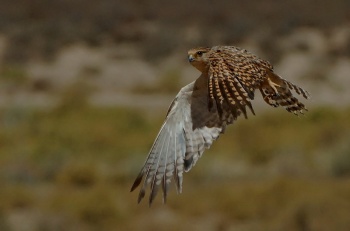(Incomplete template) |
(All sections now started. References updated. Incomplete gone) |
||
| Line 1: | Line 1: | ||
| − | + | [[Image:Greater_Kestrel.jpg|thumb|550px|right|Photo by {{user|Gashead|Gashead}}<br />[[Etosha National Park]], [[Namibia]], August 2004]] | |
| − | [[Image:Greater_Kestrel.jpg|thumb|550px|right|Photo by {{user|Gashead|Gashead}}<br /> | ||
;[[:Category:Falco|Falco]] rupicoloides | ;[[:Category:Falco|Falco]] rupicoloides | ||
==Identification== | ==Identification== | ||
| + | 29–37 cm | ||
| + | *Rufous plumage | ||
==Distribution== | ==Distribution== | ||
[[Africa]]:<br /> | [[Africa]]:<br /> | ||
| Line 9: | Line 10: | ||
'''Southern Africa''': [[Namibia]], [[Botswana]], [[Zimbabwe]], [[South Africa]], [[KwaZulu-Natal]], [[Lesotho]] | '''Southern Africa''': [[Namibia]], [[Botswana]], [[Zimbabwe]], [[South Africa]], [[KwaZulu-Natal]], [[Lesotho]] | ||
==Taxonomy== | ==Taxonomy== | ||
| − | ====Subspecies<sup>[[#References|[1]]]</sup> | + | ====Subspecies==== |
| + | [[Image:12347Greater Kestrel Flight.jpg|thumb|350px|right|Photo by {{user|Mybs|Mybs}}<br />Kgalagadi Transfrontier Park, [[South Africa]], September 2005 ]] | ||
| + | There are 3 subspecies<sup>[[#References|[1]]]</sup>: | ||
*''F. r. fieldi'': | *''F. r. fieldi'': | ||
:*[[Ethiopia]] and [[Somalia]] | :*[[Ethiopia]] and [[Somalia]] | ||
| Line 17: | Line 20: | ||
:*Acacia steppes of southern [[Africa]] | :*Acacia steppes of southern [[Africa]] | ||
==Habitat== | ==Habitat== | ||
| − | |||
Dry areas ranging from open grassland and arid savanna to desert. | Dry areas ranging from open grassland and arid savanna to desert. | ||
| − | |||
==Behaviour== | ==Behaviour== | ||
| + | ====Diet==== | ||
| + | Their main diet consists of beetles, termites and grasshoppers. | ||
==References== | ==References== | ||
| − | #{{Ref- | + | #{{Ref-Clements6thAug14}}#Avibase |
| + | #Handbook of the Birds of the World Alive (retrieved August 2014) | ||
{{ref}} | {{ref}} | ||
==External Links== | ==External Links== | ||
Revision as of 21:39, 29 August 2014
- Falco rupicoloides
Identification
29–37 cm
- Rufous plumage
Distribution
Africa:
Western Africa: Angola
Eastern Africa: Eritrea, Ethiopia, Somalia, Kenya, Tanzania, Zambia, Mozambique
Southern Africa: Namibia, Botswana, Zimbabwe, South Africa, KwaZulu-Natal, Lesotho
Taxonomy
Subspecies
There are 3 subspecies[1]:
- F. r. fieldi:
- F. r. arthuri:
- F. r. rupicoloides:
- Acacia steppes of southern Africa
Habitat
Dry areas ranging from open grassland and arid savanna to desert.
Behaviour
Diet
Their main diet consists of beetles, termites and grasshoppers.
References
- Clements, J. F., T. S. Schulenberg, M. J. Iliff, D. Roberson, T. A. Fredericks, B. L. Sullivan, and C. L. Wood. 2014. The eBird/Clements checklist of birds of the world: Version 6.9., with updates to August 2014. Downloaded from http://www.birds.cornell.edu/clementschecklist/download/
- Avibase
- Handbook of the Birds of the World Alive (retrieved August 2014)
Recommended Citation
- BirdForum Opus contributors. (2024) Greater Kestrel. In: BirdForum, the forum for wild birds and birding. Retrieved 16 April 2024 from https://www.birdforum.net/opus/Greater_Kestrel





